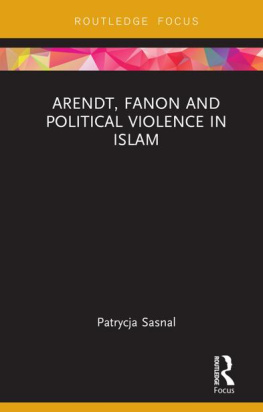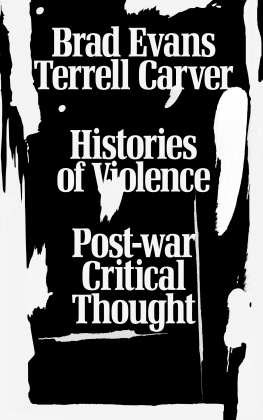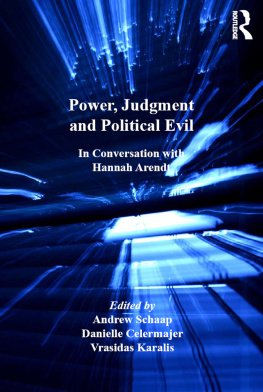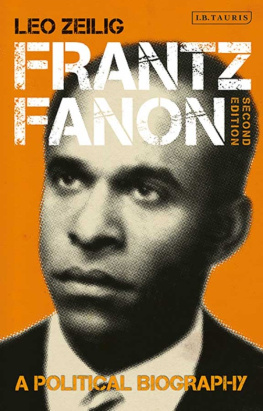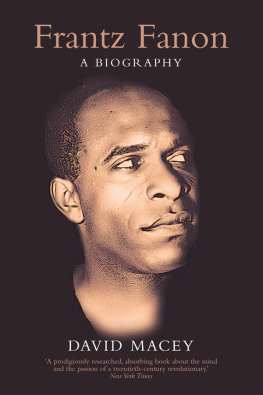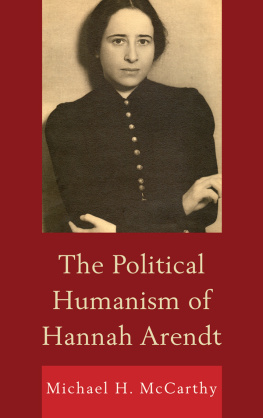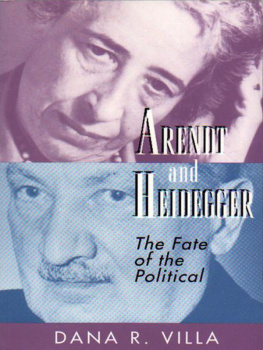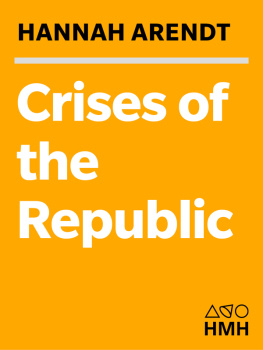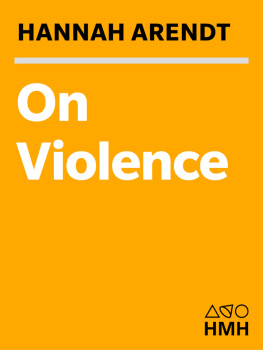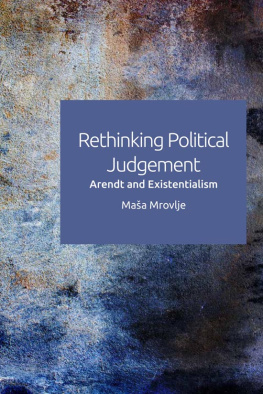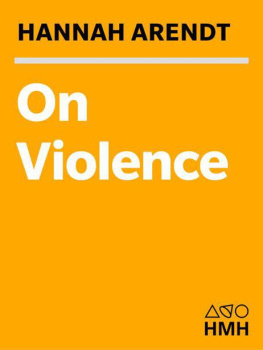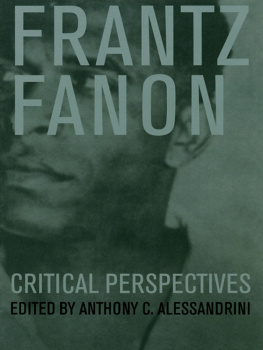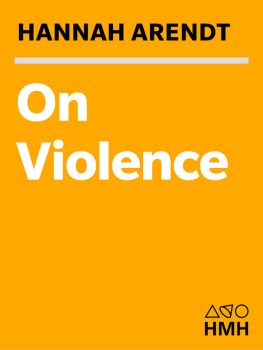Patrycja Sasnal - Arendt, Fanon and Political Violence in Islam
Here you can read online Patrycja Sasnal - Arendt, Fanon and Political Violence in Islam full text of the book (entire story) in english for free. Download pdf and epub, get meaning, cover and reviews about this ebook. year: 2019, publisher: Routledge, genre: Politics. Description of the work, (preface) as well as reviews are available. Best literature library LitArk.com created for fans of good reading and offers a wide selection of genres:
Romance novel
Science fiction
Adventure
Detective
Science
History
Home and family
Prose
Art
Politics
Computer
Non-fiction
Religion
Business
Children
Humor
Choose a favorite category and find really read worthwhile books. Enjoy immersion in the world of imagination, feel the emotions of the characters or learn something new for yourself, make an fascinating discovery.
- Book:Arendt, Fanon and Political Violence in Islam
- Author:
- Publisher:Routledge
- Genre:
- Year:2019
- Rating:5 / 5
- Favourites:Add to favourites
- Your mark:
- 100
- 1
- 2
- 3
- 4
- 5
Arendt, Fanon and Political Violence in Islam: summary, description and annotation
We offer to read an annotation, description, summary or preface (depends on what the author of the book "Arendt, Fanon and Political Violence in Islam" wrote himself). If you haven't found the necessary information about the book — write in the comments, we will try to find it.
Arendt, Fanon and Political Violence in Islam — read online for free the complete book (whole text) full work
Below is the text of the book, divided by pages. System saving the place of the last page read, allows you to conveniently read the book "Arendt, Fanon and Political Violence in Islam" online for free, without having to search again every time where you left off. Put a bookmark, and you can go to the page where you finished reading at any time.
Font size:
Interval:
Bookmark:
In this tremendously thoughtful and very engaging book, Patrycja Sasnal offers a brilliant study of two of the most important political theorists of the twentieth century, Fanon and Arendt, and then interprets violence in the contemporary Arab world using their tools of analysis. Her study is original, insightful, and challenging.
Susannah Heschel, Eli Black Professor of Jewish Studies, Dartmouth College
This book looks at contemporary political violence, in the form of jihadism, through the lens of a philosophical polemic between Hannah Arendt and Frantz Fanon: intellectual representatives of the global north and global south.
It explores the relationship of Arendts thought, mostly as expressed in On Violence (1969), to Fanons The Wretched of the Earth (1961) and the transposition of that relationship to the contemporary phenomenon of violent Islamic extremism. The book reveals a greater commonality between Fanon and Arendt as well as the universal function of jihadism that satisfies the conditions for political violence, as categorized by Fanon in the global south and Arendt in the global north. Read in tandem, Arendt and Fanon help uncover the fundamental problems of our European, American, Middle Eastern and African political systems as well as north-south relations. By studying political theory, the book finds global political commonalities in a postcolonial reality.
Written in an accessible style, this book will be of great interest to undergraduates and graduates in philosophy, political sciences and international relations (IR), sociology and Middle Eastern studies as well as scholars and professionals interested in radicalization; violent extremism; and the foreign policies of European, Middle Eastern and African countries.
Patrycja Sasnal is a political scientist, philosopher and Arabist specializing in IR in the Middle East, with a focus on radicalization, political violence, postcolonial theory and migration. She is currently the head of the Middle East and Africa programme at the Polish Institute of International Affairs.
Series Editor: Mark Jackson, Senior Lecturer in Postcolonial Geographies, School of Geographical Sciences, University of Bristol, UK
This series provides a forum for innovative, critical research into the changing contexts, emerging potentials, and contemporary challenges ongoing within postcolonial studies. Postcolonial studies across the social sciences and humanities are in a period of transition and innovation. From environmental and ecological politics, to the development of new theoretical and methodological frameworks in posthumanisms, ontology, and relational ethics, to decolonizing efforts against expanding imperialisms, enclosures, and global violences against people and place, postcolonial studies are never more relevant and, at the same time, challenged. This series draws into focus emerging transdisciplinary conversations that engage key debates about how new postcolonial landscapes and new empirical and conceptual terrains are changing the legacies, scope, and responsibilities of decolonising critique.
Coloniality, Ontology, and the Question of the Posthuman
Edited by Mark Jackson
Unsettling Eurocentrism in the Westernized University
Edited by Julie Cupples and Ramn Grosfoguel
History, Imperialism, Critique
New Essays in World Literature
Edited by Asher Ghaffar
Arendt, Fanon and Political Violence in Islam
Patrycja Sasnal
For more information about this series, please visit: https://www.routledge.com/Routledge-Research-on-Decoloniality-and-New-Postcolonialisms/book-series/RRNP
Patrycja Sasnal

First published 2020
by Routledge
2 Park Square, Milton Park, Abingdon, Oxon OX14 4RN
and by Routledge
52 Vanderbilt Avenue, New York, NY 10017
Routledge is an imprint of the Taylor & Francis Group, an informa business
2020 Patrycja Sasnal
The right of Patrycja Sasnal to be identified as the author of this work has been asserted by her in accordance with sections 77 and 78 of the Copyright, Designs and Patents Act 1988.
All rights reserved. No part of this book may be reprinted or reproduced or utilised in any form or by any electronic, mechanical, or other means, now known or hereafter invented, including photocopying and recording, or in any information storage or retrieval system, without permission in writing from the publishers.
Trademark notice: Product or corporate names may be trademarks or registered trademarks, and are used only for identification and explanation without intent to infringe.
British Library Cataloguing-in-Publication Data
A catalogue record for this book is available from the British Library
Library of Congress Cataloging-in-Publication Data
A catalog record has been requested for this book
ISBN: 978-0-367-25959-4 (hbk)
ISBN: 978-0-429-29075-6 (ebk)
Typeset in Times New Roman
by codeMantra
To Marek
I am indebted to Magda roda from the University of Warsaw, who introduced me to Hannah Arendt and made me properly structure the topic of what was going to be a thesis in philosophy. Magda and Agnieszka Nogal were the first reviewers of the very first draft of this book. If it wasnt for their welcome reception, most probably I would not have worked on this text more.
I cannot thank enough the reviewers commissioned by Faye Leerink at Taylor & Francis and Faye herself. They helped improve the text significantly, although of course I am solely to blame for its shortcomings.
My husband, Marek, encouraged me to work on this book daily by asking the same, usually annoying, question whenever he saw me at the desk: Are you working on the book? I want to thank him for that dearly.
| BPF | Between Past and Future |
| BSWM | Black Skin White Masks |
| EiJ | Eichmann in Jerusalem |
| HC | Human Condition |
| OoT | Origins of Totalitarianism |
| OR | On Revolution |
| OV | On Violence |
| WotE | Wretched of the Earth |
| WR | We Refugees |
This study looks at contemporary political violence in the form of jihadism through the lens of a philosophical polemic between Hannah Arendt and Frantz Fanon: intellectual representatives of the global north and global south. It does not aspire to analyse political violence in Islam comprehensively, neither in doctrine nor praxis. Its interest is (1) the relation of Hannah Arendts thought mostly as expressed in On Violence (OV, 1969) to Frantz Fanons The Wretched of the Earth (WotE, 1961) and (2) the transposition of that relation to the phenomenon of violent Islamic extremism. Throughout the study a greater commonality between Fanon and Arendt is revealed than in existing literature, as well as the universal function of jihadism that satisfies the conditions for political violence as categorised by Fanon in the global south and Arendt in the global north.
Next pageFont size:
Interval:
Bookmark:
Similar books «Arendt, Fanon and Political Violence in Islam»
Look at similar books to Arendt, Fanon and Political Violence in Islam. We have selected literature similar in name and meaning in the hope of providing readers with more options to find new, interesting, not yet read works.
Discussion, reviews of the book Arendt, Fanon and Political Violence in Islam and just readers' own opinions. Leave your comments, write what you think about the work, its meaning or the main characters. Specify what exactly you liked and what you didn't like, and why you think so.

